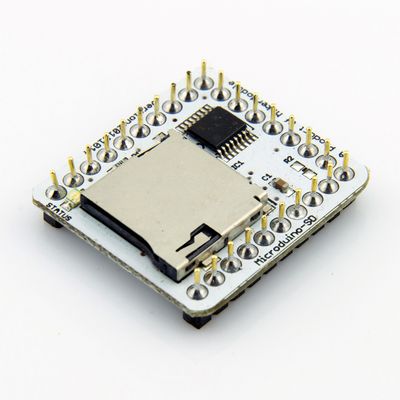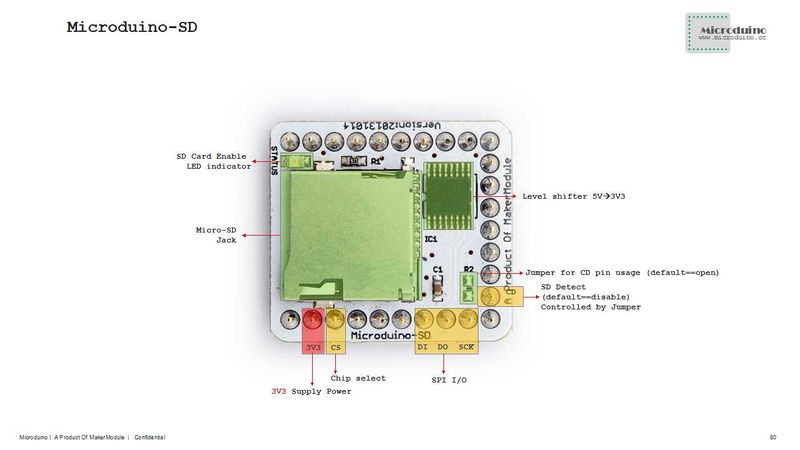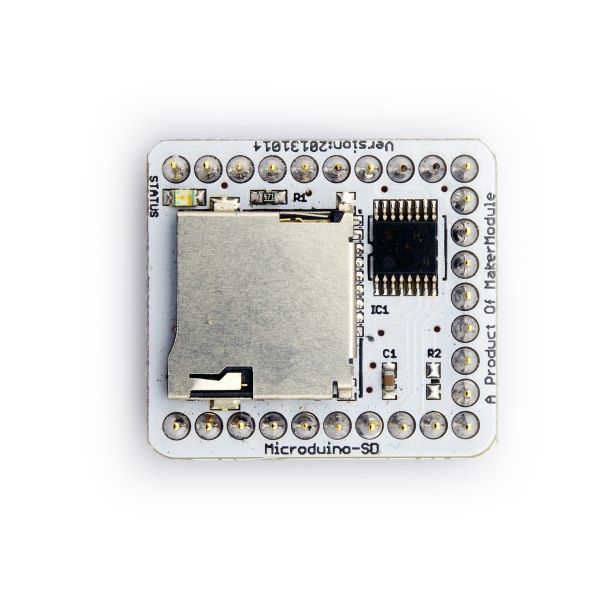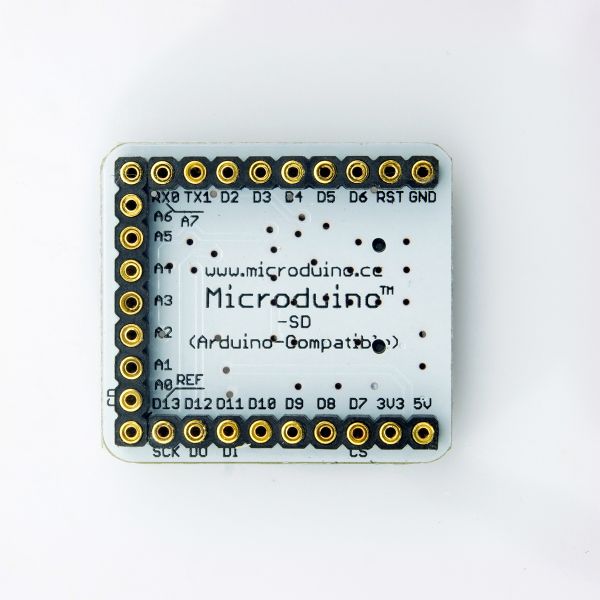Difference between revisions of "Microduino-Module SD"
From Microduino Wiki
| (19 intermediate revisions by 3 users not shown) | |||
| Line 1: | Line 1: | ||
| + | {{Language|Microduino-SD}} | ||
{| style="width: 800px;" | {| style="width: 800px;" | ||
|- | |- | ||
| | | | ||
| − | [[ | + | [[File:Microduino-SD-T.jpg|400px|thumb|right|Microduino-SD]] |
| − | Microduino- | + | |
| − | + | Microduino-SD aims to read and write data of a memory card. | |
| − | + | ||
| − | + | ||
| − | + | ||
| + | |||
| + | |||
| + | |||
| + | |||
| + | |||
| + | |||
| + | |||
| + | |||
| + | |||
| + | ==Features== | ||
| + | *Adopt high reliable contact structure as well as a 2.2mm or 2.4mm-thick microsd card holder; | ||
| + | *Small, cheap, stackable and open; | ||
| + | *Open hardware circuit design and Arduino compatible programming development environment; | ||
| + | *Uniform Microduino interface standard and rich peripheral modules, capable of having a fast and flexible connection and extension with other modules and sensors in accord with Microduino interface standard; | ||
| + | *Easy to be integrated to pegboards with a 2.45-pitch female header connector interface. | ||
| + | |||
| + | ==Specifications== | ||
| + | *The memory card it supports:MicroSD(TF); | ||
| + | [[File:SD-Pinout-1.jpg|800px|thumb|center|Microduino-SD-Pinout]] | ||
| + | |||
| + | ==Document== | ||
| + | Eagle PCB '''[[File:Microduino-SD.zip]]''' | ||
| + | |||
| + | ===Main components=== | ||
| + | * Card holder: microsd '''[[File:MicroSD.pdf]]''' | ||
| + | * Level conversion chip: TC74HC4050 '''[[File:TC74HC4050AF.pdf]]''' | ||
| + | |||
| + | ==Development== | ||
| + | ===Arduino library and supported package=== | ||
| + | *Adopt adfaruit SD library: | ||
| + | **Original library:(Core+ can't be used directly)【'''[https://github.com/adafruit/SD github download]'''】 | ||
| + | **Changed library: (The spi pin of Core+ has been changed)【'''[[File:Lib SD.zip]]'''】 | ||
| + | **SimpleSDAudio: https://github.com/Microduino/Microduino_Tutorials/tree/master/Microduino_Libraries/_06_Microduino_SD_SimpleSDAudio | ||
| + | *Microduino core module can be combined with the sensor module to store and read data,and then analyze, process these data. | ||
| + | |||
| + | ==Application== | ||
| + | |||
| + | ===Program Download=== | ||
| + | Program test: '''[[File:Program Test SD.zip]]''' | ||
| + | |||
| + | ===Microduino-SD file read,write,delete test=== | ||
| + | *All hardware needed: Microduino FT232R, Microduino Core and Microduino SD; | ||
| + | *All software needed: Microduino test program(Arduino terminal), Arduino IDE(version 1.0 and higher) and SD library; | ||
| + | *Put all the download library file into the libraries of Arduino IDE installation folder; | ||
| + | *Start Arduino IED, open Microduino test program and choose Microduino Core(Atmega328p@15M,5V), then download; | ||
| + | *Below are four parts, which can be checked with OLED(If you don't have OLED, you can check with the serial monitor): | ||
| + | **Check whether the CS pin is ok | ||
| + | **Write data into SD card; | ||
| + | **Read out the data of the specified file inside SD card; | ||
| + | **Delete the specified file inside SD card; | ||
| − | |||
| − | |||
| − | |||
| − | |||
| − | |||
| − | |||
==Buy== | ==Buy== | ||
| − | + | ||
| − | |||
| − | |||
==History== | ==History== | ||
| − | |||
| − | |||
| − | |||
| − | |||
| − | |||
| − | |||
| − | |||
| − | |||
| − | |||
| − | |||
| − | |||
| − | |||
| − | |||
| − | |||
| − | |||
| − | |||
| − | |||
| − | |||
==Pictures== | ==Pictures== | ||
| − | [[ | + | [[File:Microduino-SD-t.jpg|thumb|600px|center|Front]] |
| − | [[ | + | [[File:Microduino-SD-b.jpg|thumb|600px|center|Back]] |
| − | |||
| − | |||
|} | |} | ||
Latest revision as of 10:11, 9 September 2016
| Language: | English • 中文 |
|---|
|
Microduino-SD aims to read and write data of a memory card.
ContentsFeatures
Specifications
DocumentEagle PCB File:Microduino-SD.zip Main components
DevelopmentArduino library and supported package
ApplicationProgram DownloadProgram test: File:Program Test SD.zip Microduino-SD file read,write,delete test
BuyHistoryPictures |



